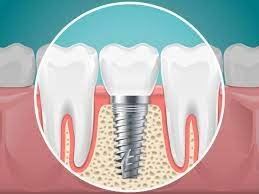Last Updated on March 12, 2024 by admin
Missing teeth can have a major impact on a person’s facial shape, bite alignment, and overall facial aesthetics. The causes of missing teeth are varied and can include cavities, gum disease, and physical trauma.
Approximately 120 million in the United States are missing one or more teeth. If you are missing teeth, dental implants may be the perfect solution for you.
In this blog post, we will look at the different types of dental implants that are available today. The two common types are endosteal and subperiosteal.
Table of Contents
Endosteal Implants
The most common type of dental implant is endosteal. The implant is usually made of titanium resemble small screws that are placed in the jawbone. These screws protrude through the gum and hold the replacement tooth in place.
Not everyone will be eligible for endosteal implants. The general criteria for an endosteal implant include:
- Good oral health
- Healthy gum tissue
- Fully grown jawbone
- Sufficient bone in the jaw
- Unwillingness or inability to wear dentures
There are a number of steps involved in the endosteal implant procedure. These include the implant place stage, osseointegration stage (where the jawbone grows into the implant), the abutment placement stage, and the placement of the new tooth or teeth.
It is worth noting that the osseointegration stage of this dental treatment can take between two to six months.
Subperiosteal Implants
If it has been determined that there is not sufficient healthy jawbone to support an endosteal implant, your doctor may recommend this option. Rather than inserting the implant into the bone, these implants are placed on or above the bone.
A subperiosteal implant does not offer the same level of stability as an endosteal implant, though it has a shorter treatment time. If you are interested in learning more about the different types of dental implants, check out Caldwell, Bills & Petrilli Dentistry.
What Are the Benefits of Dental Implants?
If you are missing a tooth or several teeth, there are many advantages to dental implants. For starters, missing teeth can affect the aesthetics of your smile and have an effect on a person’s confidence and self-esteem. Dental implants are an excellent long-term solution to missing teeth.
While many people with missing teeth opt for dentures, these can shift and slip within the mouth which can result in speech issues. With dental implants, there is no need to worry about the teeth slipping. Implants are also more comfortable than removable dentures and make eating easier.
The Different Types of Dental Implants
Dental implants are a popular and effective dental procedure for people with missing teeth. If you are considering dental implants, we recommend that you speak to a professional dental clinic about the best dental implants for you.
Like this blog post on the different types of dental implants that are available? Be sure to check out our other informative articles on a wide range of interesting topics.
Impact of Missing Teeth on Facial Aesthetics and Dental Health
Missing teeth can have a significant impact on a person’s facial shape, bite alignment, and overall facial aesthetics. Beyond mere aesthetics, the absence of teeth can affect oral health and confidence levels. The causes of tooth loss are diverse, ranging from cavities and gum disease to physical trauma. Approximately 120 million people in the United States are missing one or more teeth, highlighting the prevalence of this issue. Dental implants emerge as a promising solution for individuals grappling with tooth loss, offering both functional and aesthetic benefits.
Read also: 5 Crystal Clear Signs That You’re Drinking Contaminated Water.













